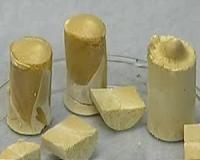 |
Helsinki, Finland (UPI) Feb 12, 2009 Finland on Friday removed the last hurdle for a major gas pipeline to be built from Russia to Germany under the Baltic Sea. A Finnish Environmental Agency Friday gave its go-ahead to start the construction of Nord Stream, a 750-mile natural gas pipeline directly linking Russia and Germany under the Baltic Sea to bypass transit countries in Eastern and Central Europe. Currently, most of the Russian gas arrives in Europe via transit pipelines through Ukraine, a country that has had shaky relations with Russia. Two major Russian-Ukrainian rows over prices temporarily halted deliveries to European customers. A joint European-Russian project long planned, the $11 billion pipeline is expected to go online in 2011 or 2012. It's designed to eventually deliver up to 55 billion cubic meters of gas per year to Europe, enough for around 25 million households. Gazprom holds the majority in the Nord Stream consortium with 51 percent, Germany's Wintershall and Eon Ruhrgas own 20 percent each with Dutch Gasunie holding the remaining 9 percent. Nord Stream has been mentioned by the European Commission as a priority energy project but has run into opposition from individual European states, including Poland and the Baltic countries. Moreover, environmental concerns have delayed the permitting process. Last year, governments in Germany, Russia, Denmark, Sweden and Finland gave their green light to the pipeline -- the Finnish environmental agency was delaying its decision. Russian Prime Minister Vladimir Putin earlier this week traveled to Helsinki to promise Finnish authorities that the pipeline would be safe. Nord Stream says it has spent around $130 million on environmental studies and the permitting process. Its construction has been held up by concerns that the laying of the pipes could damage marine life and stir up toxins held in chemical weapons dumped into the Baltic Sea over the past decades. Already, the Baltic Sea is considered one of the world's most polluted waters. The Soviets dumped their industrial waste into the Baltic Sea, and all major military powers have unloaded their chemical and conventional weapons there since World War I, with an estimated 100,000 tons sitting on the seabed. Because the sea is semi-enclosed, it takes very long for pollutants to be flushed out. Environmental groups World Wildlife Fund and and Friends of the Earth have issued a civil lawsuit against the plans. Meanwhile, Gazprom and European utilities are involved in another major pipeline project. Work on South Stream, which would deliver gas to Austria and Italy via the Black Sea and Bulgaria, is due to start in late 2010.
Share This Article With Planet Earth
Related Links Powering The World in the 21st Century at Energy-Daily.com
 New Material Absorbs And Conserves Oil
New Material Absorbs And Conserves OilCleveland OH (SPX) Feb 12, 2010 An ultra-lightweight sponge made of clay and a bit of high-grade plastic draws oil out of contaminated water but leaves the water behind. And, lab tests show that oil absorbed can be squeezed back out for use. Case Western Reserve University researchers who made the material, called an aerogel, believe it will effectively clean up spills of all kinds of oils and solvents on factory floors ... read more |
|
| The content herein, unless otherwise known to be public domain, are Copyright 1995-2010 - SpaceDaily. AFP and UPI Wire Stories are copyright Agence France-Presse and United Press International. ESA Portal Reports are copyright European Space Agency. All NASA sourced material is public domain. Additional copyrights may apply in whole or part to other bona fide parties. Advertising does not imply endorsement,agreement or approval of any opinions, statements or information provided by SpaceDaily on any Web page published or hosted by SpaceDaily. Privacy Statement |